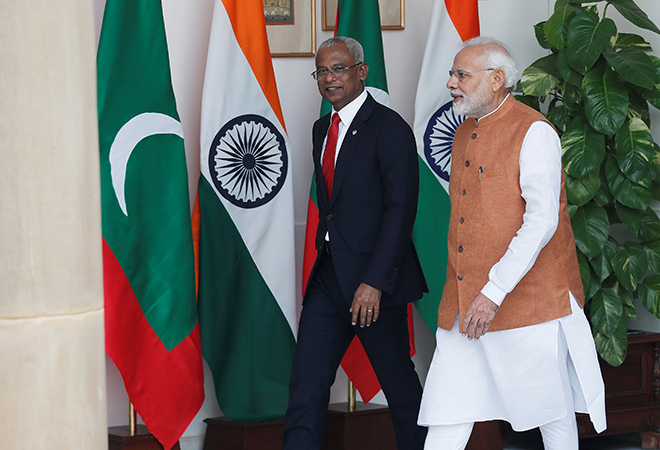
Presidential elections in Maldives are fast approaching and its internal politics appears to be in a state of flux. As the Opposition coalition in Maldives works hard to ensure their leader and presidential candidate, former President Abdullah Yameen (who is known to not be in favour of India) Is eligible to run in the upcoming September elections, India must consider the future of its relationship with this archipelago nation.
India-Maldives relations have been on an upward trajectory ever since the incumbent Ibrahim Solih Government came into power in 2018, standing in blunt contrast with the previous administration of Abdulla Yameen (2013-2018). These were turbulent years in bilateral relations—the GMR debacle, Maldives declining India’s invitation to join the MILAN naval exercises, and Maldives rejecting India’s gift of military helicopters are just some of the low points.
As the deadline for candidacy application submissions nears (7 August), it is important to consider whether a change in government will put India in an unfavourable position in Maldives.
As the deadline for candidacy application submissions nears (7 August), it is important to consider whether a change in government will put India in an unfavourable position in Maldives. Post-elections, will the “India-Out” campaign have an enduring impact? Crucially, India must consider the ways in which it can ensure that the diplomatic focus and capital it rightly invested in Maldives over the last few years is not upturned by a change in government.
India-Out campaign
The India-Out campaign led by Yameen has been directed at the Solih government (ever since it came into power), accusing it of violating Maldivian sovereignty by allowing Indian military presence on the islands. The government has repeatedly denied these allegations, and last year, it issued a presidential decree banning “
Campaigns that Incite Hatred Against Various Countries Under Different Slogans,” as well as specifically mentioning the India-Out protests. Though the protests appear to be on pause, the target of Yameen’s presidential election campaign remains its dominant Indian Ocean neighbour, India. Speaking to the local media, Yameen is reported to have said that
“the 2023 elections will be for defeating India and their influence in Maldives” and requested his supporters to work towards this goal.
While there are certain elements of this campaign that act as stumbling blocks for India when assessing its future challenges with Maldives—such as the sustained nature of the campaign, its viciousness and its possible funding sources—this is not a new problem confronting New Delhi. Anti-India sentiments are often drummed up by Opposition parties at the time of elections. This has happened repeatedly in Bangladesh, Nepal, Sri Lanka, and more recently even in Mauritius. Within South Asian geopolitics, this is certainly par for the course.
Anti-India sentiments are often drummed up by Opposition parties at the time of elections.
China, likewise, has been dragged into Maldives’ domestic politics when Ibrahim Solih’s party, Maldivian Democratic Party (MDP), were in the Opposition and its then-presidential candidate Mohamed Nasheed was campaigning for the 2008 elections. Nasheed is highly critical of China’s presence in Maldives. Over the years, he has been calling out Chinese investments as
debt-trap diplomacy, demanding
an audit of China-funded projects, and, in his more audacious moments, going so far as to say that
“in a sense, we now need to buy back our sovereignty from China”. Yet, it was under Nasheed’s administration that China completed one of their largest projects in the country—1,000 housing units in Hulhumalé.
What politicians say during campaigning, particularly the Opposition, and the policies they ultimately choose once in power are not necessarily the same thing. If and when a new administration is sworn in, those in power will find themselves faced with the same larger political economy challenges as the previous government. As they seek to address these challenges with actual, on-the-ground implementable policies, these leaders often find it prudent to work with all those that offer attractive solutions to them.
India, therefore, must look beyond the immediate impact of the India-Out campaign and continue to offer assistance based on a more long-term view of Maldives’ development. Here, there are three ways in which India’s focus can bring enormous benefits to both countries irrespective of Maldives’ internal domestic politics.
A development-led approach
In truth, India’s approach in more recent years has been development focused. India’s outreach has not simply been with the government in power but aimed at benefitting the people of Maldives. Its emphasis on High Impact Community Projects (HICP) has been well-received.
Other recently discussed projects include MoUs to digitise a school in Vilufushi and upgrade a computer lab in Nilandhoo.
Maldivian Foreign Minister (FM) Abdulla Shahid’s recent visit to New Delhi saw the signing of
nine new MoUs related to HICPs. These projects are wide-ranging and impact the actual lives of the people, such as installing streetlights in Kondey (Gaaf Alif Atoll) and a volleyball court in Kanditheemu (Shaviyani Atoll). While adding streetlights might not carry the grandeur of large infrastructure projects such as bridge building and port development, their impact on the community is undeniable. Streetlights aid islands to work longer hours and also help support guesthouses, restaurants, and other small businesses. As
Indian High Commissioner Sunjay Sudhir explained, the nature of such projects is that its impact is on “each and every inhabitant of the island”. Other recently discussed projects include MoUs to digitise a school in Vilufushi and upgrade a computer lab in Nilandhoo. Regardless of their political affiliation, no government can deny the impact such projects have on the community.
Youth employability and entrepreneurship
Future projects that are targeted at youth employability and entrepreneurship will be extremely beneficial to Maldives.
More than 35 percent of Maldives’ population are young people aged 15-35 preparing to enter the workforce. The World Bank notes, that
despite its strong economic growth, Maldives has a high rate of youth unemployment. Though the Maldives has recovered well from the pandemic, its economic development suffers from an inherent vulnerability that stems from a narrow economic base, lack of diversification, and overdependence on tourism. Since
safety nets for employees tend to be limited to pensions, this adversely impacts Maldivian youth, most of them living in the atolls. Unable to find work, it has been found that they are increasingly turning to casual and self-employment. Increasing employment opportunities for young people will remain an important goal for the Maldivian government irrespective of who wins the elections. India’s HICPs in Maldives must include projects that aim to improve employability and foster entrepreneurship among the youth.
Early completion of projects
The India-funded sea bridge being built by the Indian infrastructure company Afcons Ltd., under the Greater Malé Connectivity Project (GMCP) is the single largest infrastructure project to be undertaken in Maldives. The 6.74-km long sea bridge and causeway link between Malé and the nearby islands of Vilingli, Gulhifalhu and Thilafushi will have an enormous impact on the lives of the Maldivian people. It will not only address the issue of connectivity, which is paramount in archipelagic nations, but it will provide relief to the very real and immediate problem of population density in Malé, while also creating jobs and in the long run stimulating economic activity.
The biggest challenge for India with regards to this project will be its ambitious completion date. Historically, India suffers from a negative image of having an implementation problem when it comes to its projects in South Asia. The Opposition has already raised concerns about the sea-bridge in the Parliament. MP of Maavashu and PNC Vice President, Mohamed Saeed, has listed his protestations about the project both in Parliament and on Twitter. These range from questions about the quality of construction, its environmental impact, particularly on Vilimale reef, and claims that Afcons has gone bankrupt.
“This is a much more serious issue than the GMR case” he criticised. Invoking GMR was a clear political move, however, given the fiasco it turned into, this comparison should concern India.
The biggest challenge for India with regards to this project will be its ambitious completion date.
Admittedly, some delays will occur as a result of the disruptions and backlog caused by the COVID-19 pandemic. Given the nature and complexity of construction, namely that it is in mid-sea, there will be further unprecedented challenges and delays ahead. However, ensuring early completion of this project must be a priority for India, first, to fight the negative perceptions regarding inordinate delays in India’s implementation, and, second, to offset any negative sentiments around this particular project given its iconic nature.
Looking to the future
The PPM-PNC Opposition coalition,
in its latest attempt to secure Yameen’s nomination has called for the postponement of the presidential election. As the domestic situation in Maldives is evolving daily, it is important to remember that international relations are dynamic and a change in government could throw up new challenges in bilateral relations. Irrespective of what a future government in Maldives might look like or their policy priorities, China’s influence and interest in Maldives is unlikely to diminish. India must expect that Chinese projects under the Belt and Road Initiative (BRI) will likely increase in the coming years. While on an official visit to India, when asked about the expansion of BRI in Maldives, FM Shahid carefully replied, “When you are my best friend, you will not ask me to choose my friends.” India cannot, in any fairness, expect Maldives to refuse project offers from China. Instead, India must offer credible and lucrative alternatives that focus on development and youth employability and ensure early completion of its current projects.
Vinitha Revi is an Independent Scholar associated with the Observer Research Foundation
The views expressed above belong to the author(s). ORF research and analyses now available on Telegram! Click here to access our curated content — blogs, longforms and interviews.



 Presidential elections in Maldives are fast approaching and its internal politics appears to be in a state of flux. As the Opposition coalition in Maldives works hard to ensure their leader and presidential candidate, former President Abdullah Yameen (who is known to not be in favour of India) Is eligible to run in the upcoming September elections, India must consider the future of its relationship with this archipelago nation.
India-Maldives relations have been on an upward trajectory ever since the incumbent Ibrahim Solih Government came into power in 2018, standing in blunt contrast with the previous administration of Abdulla Yameen (2013-2018). These were turbulent years in bilateral relations—the GMR debacle, Maldives declining India’s invitation to join the MILAN naval exercises, and Maldives rejecting India’s gift of military helicopters are just some of the low points.
Presidential elections in Maldives are fast approaching and its internal politics appears to be in a state of flux. As the Opposition coalition in Maldives works hard to ensure their leader and presidential candidate, former President Abdullah Yameen (who is known to not be in favour of India) Is eligible to run in the upcoming September elections, India must consider the future of its relationship with this archipelago nation.
India-Maldives relations have been on an upward trajectory ever since the incumbent Ibrahim Solih Government came into power in 2018, standing in blunt contrast with the previous administration of Abdulla Yameen (2013-2018). These were turbulent years in bilateral relations—the GMR debacle, Maldives declining India’s invitation to join the MILAN naval exercises, and Maldives rejecting India’s gift of military helicopters are just some of the low points.
 PREV
PREV


